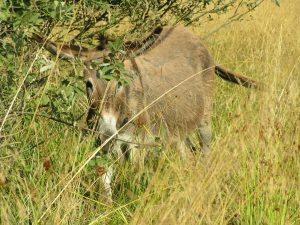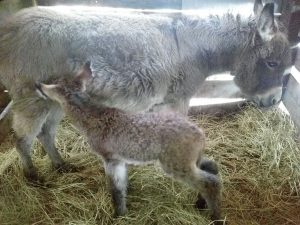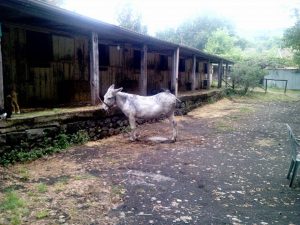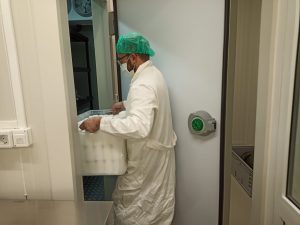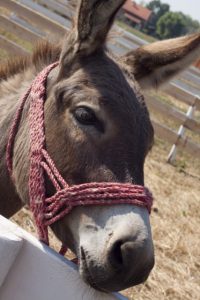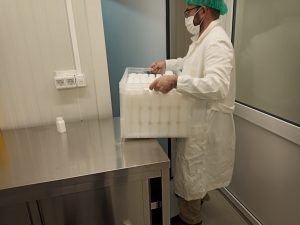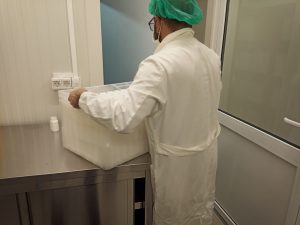Case study 04-HR
Neven Ciganović
Introduction
Near the small town Ivanić Grad which is located not far from Rugvica (in the eastern part of Zagreb county) is located the donkey farm OPG Ciganović. The main activities are donkey breeding, production of donkey’s milk and donkey’s milk cosmetics and a very small amount of fresh cow’s milk. The donkey produces milk for a few months after giving birth – 3 decilitres to half a liter a day. What’s more, a donkey can only be milked for about six months after producing a foal, and even then, only when the foal is close by. The donkey’s milk is placed in the freezer immediately after milking and fresh donkey’s milk is delivered directly to the customer. They are promoting activities and selling products through the OPG Ciganović website (https://magare.hr/) and they are active on social networks (Facebook and Instagram). Farm visitors can also visit the meadows surrounding farm and look at young and older donkeys to make sure that the milk is high quality and it comes from healthy donkeys.
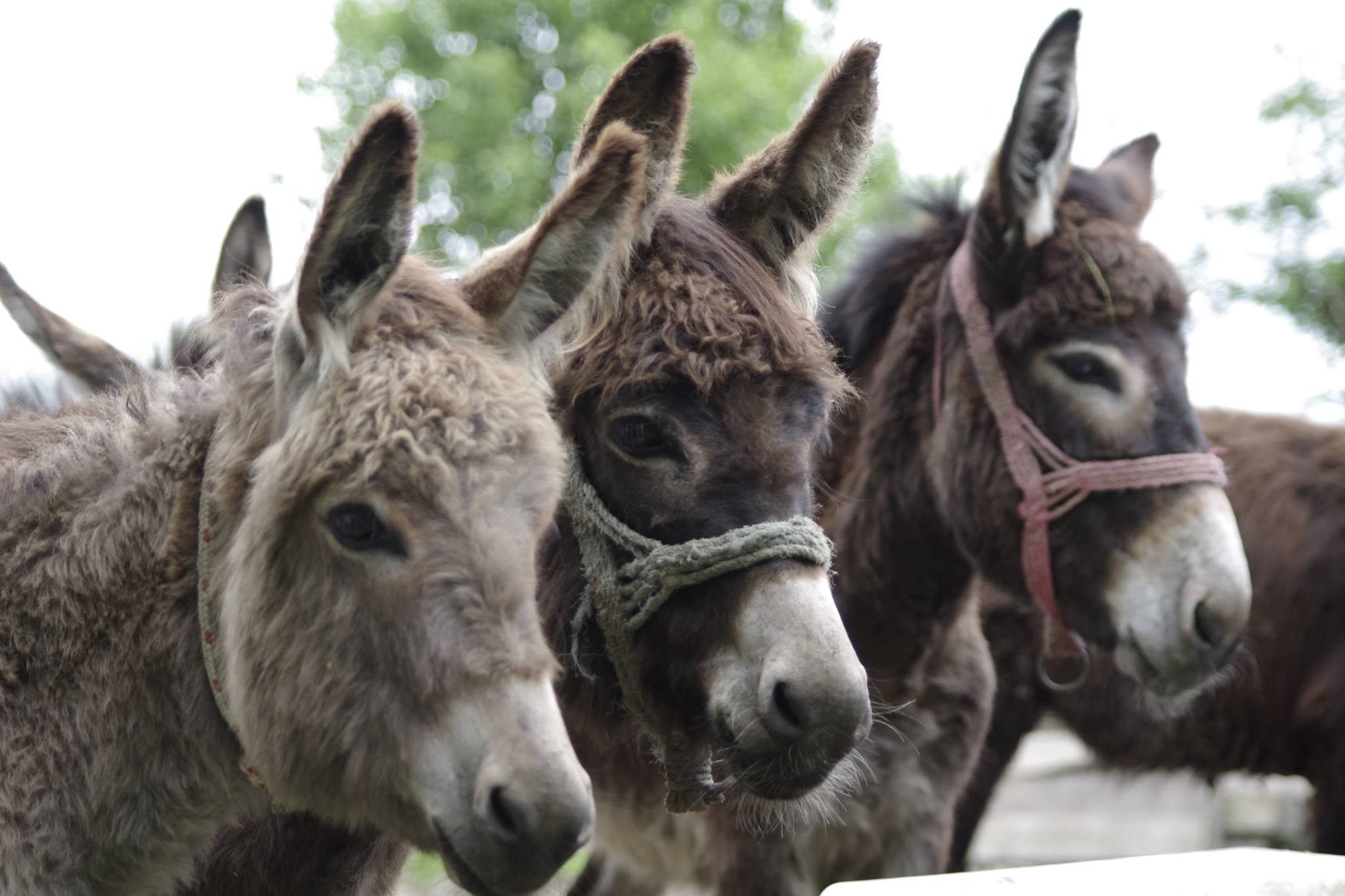
Farm/Enterprise description
Donkey’s dairy products (frozen milk and donkey’s milk cosmetics) are obtained from milk from their own farm. The family farm owns about 70 donkeys and few cows that live in an untouched environment and are fed raw materials from their own pastures. All this results in authentic and specific products that we can say are “homemade”. The farm “OPG Ciganović” is still expanding. The owners have recently embarked on the production of cosmetics and chocolate with donkey’s milk. Beside mentioned activities, organic walnuts on 28 ha and the pomegranate (Punica granatum), a fruit-bearing deciduous shrub in the family Lythraceae on 38 ha are being grown at the estate and vegetables for owner needs.
Following the needs of the market and being available to the wishes of the customer is key to today’s success. There are a lot of offers today from the European Fund for Production Improvement, through various measures every segment can be improved, from primary production to the finished product. In addition to the above, it should be said that hygiene is extremely important during the production of the product because donkey milk is a high-risk raw material. The owner needs to invest tremendous knowledge, love, effort, money and motivation of people to do it successfully.


Multifunctional farming activities related to dairy processing / Innovation related to products and/or processing
Family Ciganović is currently building a mini milk processing plant within its family farm. Filtration equipment and freezers will be located in the mini milk processing plant. Filtered milk will be a safe and quality product that will be frozen and transported in frozen form. Also, they are planning to focus on rural tourism in the near future and the improvement of sustainability of their main activities. The owners have decided to offer a tourist services and education about the donkey and milk to the visitors.
Donkey’s milk is back in fashion not only as a cosmetic product but also as a super food. Donkey’s milk is very similar to human mother’s milk and rich in vitamins and essential fatty acids, but it’s lower in fat than cow’s milk. The attractive characteristics of donkey’s milk, also defined as a nutraceutical product, seems to meet the growing consumer’s demand for natural and health-promoting foods. The new plan is to increase the production of cosmetic products with the addition of milk and develop donkey milk yogurt.
General considerations
According to the UN’s Food and Agriculture Organisation, donkey milk has “particular nutritional benefits”. It is seen as an alternative for infants affected by cow milk protein allergies. Many paediatricians suggested donkey milk in the infant’s diet as a valid alternative in terms of nutritional adequacy for subjects affected by allergy to cow milk proteins.
Despite all the advantages the main challenge is the state of the market in Croatia, where consumers are not used to purchasing donkey’s milk products, therefore the demand is relatively low. This was one of the reasons why they decided to start the production of donkey’s milk cosmetics, to make a product with longer expiration date that could be exported. In their opinion, this was found to be a good way to increase the profit. To implement process innovation and multifunctional farming activities, they received counselling in terms of milk processing technology, slightly about donkey breeding, milking practice, and animal health that was provided by university professors from the University of Zagreb, Faculty of Agriculture. Also, they passed different trainings and seminars regarding milk processing technology, animal breeding „Donkey Sanctuary” in UK. Owners did not pass different trainings and seminars regarding nutrition, HACCP implementation, as well as IPA and IPARD funds, management, application training or business plan writing.
For the future, they are planning activities related to the introduction of donkey yoghurt production with addition lyophilized donkey milk, which will maybe make a foundation for the export. To achieve all this, they made several advertising campaigns that were mainly related to advertising through social networks. Additionally, there are a lot of written texts in the media about their activities (on Google ads, Facebook, newspaper, specialised press). At this moment, they distribute the products (frozen donkey milk) by direct distribution with own delivery, on-farm sales and online sales.
Croatian government is working to formalize donkey milk business in the country consequently any specific training or specialization it could be praiseworthy, because entities in this sector need to keep up with the latest developments to meet market demands.


Training/Competences (Skills, Knowledge, Attitudes) especially relevant for the process
It takes a lot of patience and good will to carry out an activity like donkey and cow breeding, and productions of cosmetics from donkey’s milk. Also, it is necessary to keep up with market demands and to have good marketing and distribution channels. Skills such as the ability to find quick and clever ways to overcome the problems and constant work on oneself, along with the non-formal education in donkey breeding and processing technology, hygiene, marketing and finance are found to be an unavoidable part of the training of any farmer that wants to become prosperous. International seminars, educational visits to rural estates outside Croatia, participation in an Erasmus project with experts from Macedonia, participation in the innovation fair INOVA with own products were of the utmost importance. Additionally, it is very important to learn about animals feeding and about quality of donkey milk. Such donkey farms are rare and no processing practices are well known, so the producer needs to do a lot of research and gather knowledge about milk and processing but the most important thing is to remain persistent and consistent with yourself and your production.
Photo gallery

